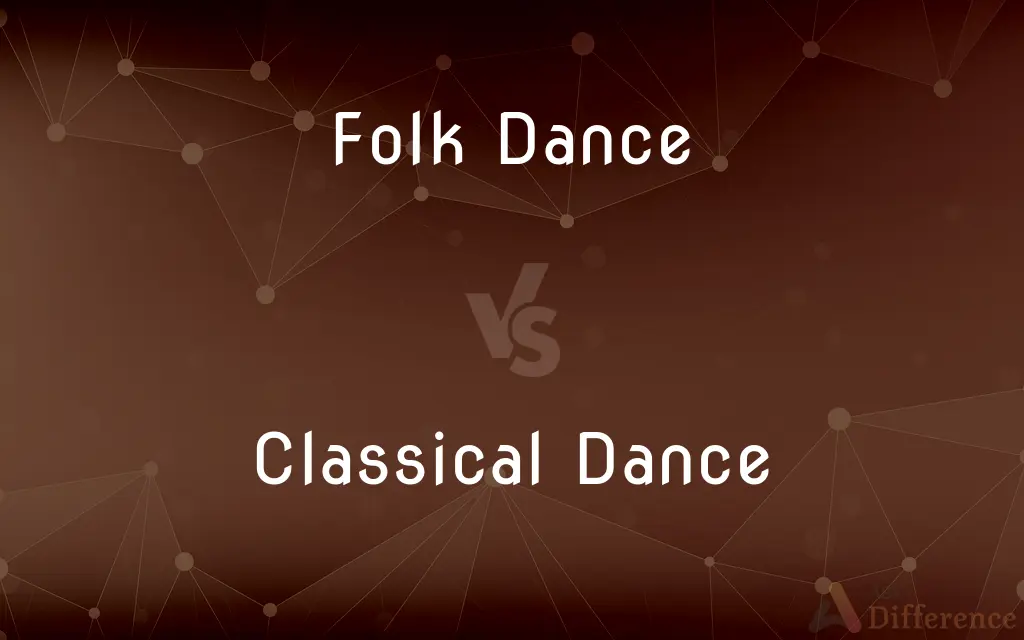Folk Dance vs. Classical Dance — What's the Difference?
By Tayyaba Rehman — Published on December 15, 2023
Folk Dance is a traditional, communal dance rooted in local customs, while Classical Dance is a refined, codified form of dance with established techniques.

Difference Between Folk Dance and Classical Dance
Table of Contents
ADVERTISEMENT
Key Differences
Folk Dance represents the traditional dances that have grown organically within communities and are passed down through generations. They often reflect the daily lives, struggles, and joys of the people from that specific region. On the other hand, Classical Dance pertains to a sophisticated style of dance that has been systematized and has a recognized set of movements, often associated with theatrical presentations.
Folk Dance, in its essence, captures the spirit of a community and is often spontaneous. It is integral to social gatherings, celebrations, and rituals. Classical Dance, however, is a studied form that requires years of training and is often performed on professional stages. It carries a long lineage of history, tradition, and narrative.
While Folk Dance is usually specific to a region or community and has unique steps and music, Classical Dance has been developed, refined, and passed down through formal schools or institutions. The choreography in Classical Dance is often set and may tell specific stories or convey particular emotions.
Folk Dance is often more accessible and can be learned informally, often without any professional training. Anyone in the community can participate, irrespective of their dance background. In contrast, Classical Dance demands rigorous training, dedication, and a deep understanding of the art form to be performed correctly.
Comparison Chart
Origin
Rooted in local customs and traditions.
Originates from codified and established techniques.
ADVERTISEMENT
Training
Informal and communal.
Requires rigorous, formal training.
Performance Setting
Often in community gatherings and informal settings.
Typically in formal stages and theaters.
Narrative
Reflects daily life and regional stories.
Often conveys historical or mythological tales.
Accessibility
Open for everyone in the community.
Demands dedicated learning and understanding of the art form.
Compare with Definitions
Folk Dance
A traditional dance reflecting a community's customs.
The village performed a Folk Dance during the harvest festival.
Classical Dance
A dance requiring rigorous formal training.
To perfect the Classical Dance, she attended a renowned academy.
Folk Dance
An informal dance integral to celebrations.
The wedding wasn't complete without the Folk Dance.
Classical Dance
An art form with codified movements.
The elegance of the Classical Dance was mesmerizing.
Folk Dance
A communal dance passed down through generations.
Every family member knew the steps to the Folk Dance.
Classical Dance
A refined dance with established techniques.
She trained for years to master the Classical Dance form.
Folk Dance
A dance portraying the daily life of a region.
The Folk Dance illustrated the fishermen's daily routines.
Classical Dance
A dance performed on professional stages.
The theater was packed for the Classical Dance performance.
Folk Dance
A spontaneous dance with regional music.
Tourists enjoyed the lively Folk Dance in the town square.
Classical Dance
A dance portraying historical or mythological tales.
The Classical Dance narrated a story from ancient scriptures.
Folk Dance
A traditional dance originating among the common people of a nation or region.
Folk Dance
The music for such a dance.
Folk Dance
A social gathering at which folk dances are performed.
Common Curiosities
Is Classical Dance performed only on formal occasions?
While Classical Dance is often associated with formal presentations, it can also be performed on various occasions.
What is the primary purpose of a Folk Dance?
Folk Dance primarily reflects and celebrates a community's traditions, customs, and daily life.
Can anyone participate in a Folk Dance?
Yes, Folk Dance is generally inclusive, allowing anyone in the community to participate.
Are Folk Dances specific to certain regions?
Yes, Folk Dances are often specific to a region or community, representing their unique customs.
How does Classical Dance differ in technique from Folk Dance?
Classical Dance is based on codified techniques and requires formal training, whereas Folk Dance is often informal and spontaneous.
Is Classical Dance always narrative?
While many Classical Dances convey stories or emotions, not all are narrative.
Are there recognized institutions for Classical Dance?
Yes, there are many renowned institutions worldwide dedicated to teaching and preserving Classical Dance forms.
How long does it take to master a Classical Dance form?
Mastering Classical Dance can take years of rigorous training and dedication.
Is music integral to Folk Dance?
Yes, music, often specific to the region, is a vital component of Folk Dance.
Do Folk Dances have specific costumes?
Often, Folk Dances have traditional costumes that add to the dance's cultural representation.
How old is the tradition of Classical Dance?
Classical Dance forms can trace their origins back hundreds or even thousands of years.
Are there multiple types of Folk Dances in one region?
Yes, a single region can have multiple Folk Dances representing different customs or occasions.
Can Folk Dance evolve over time?
Yes, while rooted in tradition, Folk Dance can adapt and evolve over time.
Can Folk Dance and Classical Dance merge or influence each other?
Yes, over time, elements of Folk Dance and Classical Dance can intermingle, leading to hybrid dance forms.
Can Classical Dance be improvised?
While Classical Dance is based on set techniques, skilled dancers might introduce some improvisation.
Share Your Discovery

Previous Comparison
Founding vs. Foundation
Next Comparison
Ionic Covalent vs. Metallic BondsAuthor Spotlight
Written by
Tayyaba RehmanTayyaba Rehman is a distinguished writer, currently serving as a primary contributor to askdifference.com. As a researcher in semantics and etymology, Tayyaba's passion for the complexity of languages and their distinctions has found a perfect home on the platform. Tayyaba delves into the intricacies of language, distinguishing between commonly confused words and phrases, thereby providing clarity for readers worldwide.
















































